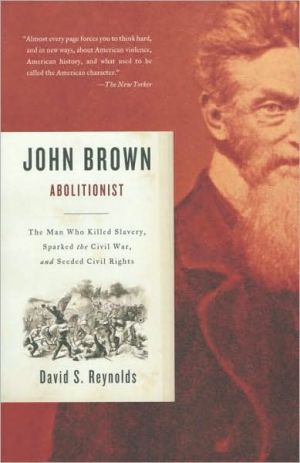

 |

|

The average rating for John Brown, Abolitionist: The Man Who Killed Slavery, Sparked the Civil War, and Seeded Civil Rights based on 2 reviews is 5 stars.
Review # 1 was written on 2011-12-21 00:00:00 Christopher Doyle Christopher DoyleThe postmodern critique has brought us the "cultural biography," which in this work aims to show three things: 1) how John Brown was a part of the culture he lived in; 2) how he transcended that culture; and 3) how he transformed it. This new approach may sound faddish or obstruse. But David Reynolds makes the final product an astounding account of John Brown's place in history. I took up the book because I knew so little about Harper's Ferry, even though it had been a watershed in American history. I got much more than I was expecting. Like other readers, I'm left wondering how this study could fail to be the final word on the man. Reynolds disposes of the canard that Brown was some sort of madman, but beyond that he draws few conclusions. He is right not to do so. John Brown's raid poses one of the hardest moral problems. Resorting to violence or taking action likely to kill people not directly involved in the evil is a dicey act, but the moral dimension drags in with it knotty questions about utilitarianism, the inherent value of human life, and half a dozen topics for which no final court of appeal has yet been found. To at least put us on the path toward these questions, the author takes time discussing the context in which Brown lived his life, formed his beliefs, and finally acted. I was surprised to find out how much is known about Brown and how much contemporaneous commentary Reynolds could bring to bear. Without taking sides, he recounts reactions to the raid. But it's not necessary to take sides to see the astonishing changes roiling the United States in the wake of the raid and John Brown's trial and hanging. Helping the book is Reynold's deft prose. He is, in fact, an English professor, and as he leads readers through Brown's life he builds a sense of drama suitable to the incredible mark on history the man would finally make. But nowhere is the author's skill more effective than when he recounts the aftermath of the raid on Harper's Ferry. I found myself reading that section of the book again and again, admiring in particular the way the author depicts for us today the thunderous effect on the nation of Brown's courtroom Apologia. Could a man with so little formal education have given the best speech ever delivered in American history? I was left at the end of the book with the sense of a man whose beliefs and actions have everything to do with the kind of country the United States is now, and what it might become. People argue whether he was a freedom fighter or a terrorist. I say people. For America's blacks there has never been a shred doubt what he was. But what's unique about this book is that it shows beyond any doubt on anyone's part that John Brown was a prophet -- a prophet of the American Enlightenment. Would a John Brown be possible in today's America, Reynolds asks. The question is disturbing. For if such a man is no longer possible, something has necessarily changed for the worse. That's not my opinion. That's a prophecy. |
Review # 2 was written on 2015-05-30 00:00:00 Elena Aladina Elena AladinaBeing born and raised in Kansas, it is perhaps no surprise that I've always thought the struggle for Kansas's status as a free or slave state was a significant part of what brought about the Civil War. But in an era when Confederate flag enthusiasts are suddenly insisting that the Civil War wasn't fought over slavery, it was high time I finally read this book my father had lent me about Brown, and the events sparking the Civil War. (Spoiler alert: My dad isn't getting this book back.) I loved this book. And it quickly became a refuge for me in a year of partisan election year bickering and mass shootings and too frequent news of black people being shot by the police. It was odd to me how intensely fond I became of Brown, even though I've never been a fan of Calvinism, and what religious feelings I do have urge me towards pacifism. Reynolds makes a strong case here for Brown as the first non-racist white American. To oppose slavery not just because it is happening to some poor creature, but because it was happening to your brother -- is it any wonder he ended up taking up arms? While racism against black people is certainly the cause we most associate with Brown, his radicalism went much further. In planning for the possibility that his assault on southern slave-holding states could lead to the dissolution of the government, Brown and a council of his carefully gathered community wrote a new constitution that established the full equality of all people -- blacks, Indians, women. I also appreciated this style of "cultural biography," which examined the cultures that shaped Brown, and then how he transcended and transformed those cultures. Like any excellent book, I am left wanting to know much more -- about the Transcendentalists, about Whitman, about Lincoln, etc., etc. |
CAN'T FIND WHAT YOU'RE LOOKING FOR? CLICK HERE!!!